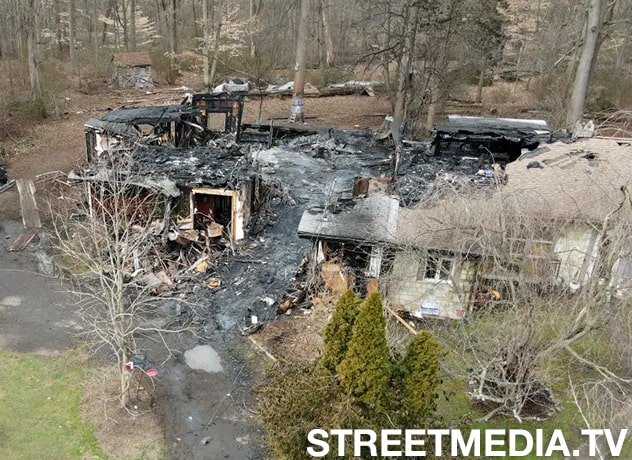Desperate New Jersey Cat Lady Sets Her House on Fire to Avoid Eviction

Recently, a bizarre and tragic incident unfolded in southern New Jersey. A woman, who was facing eviction from her rented home and decided to take extreme measures to avoid being forced out of her residence. She set her house on fire using gas and a match, causing a massive explosion that destroyed the property and several other homes in the surrounding area.
The incident was captured on video by multiple bystanders and has since gone viral on social media, sparking outrage and disbelief among viewers. The video shows flames shooting out of the windows and debris flying into the air as the explosion rips through the house. The woman can be seen running out of the house just before the blast, but she was quickly apprehended by law enforcement and taken into custody.
As the investigation into the incident continues, more details have emerged about the events leading up to the explosion. According to sources close to the investigation, the woman was facing eviction from her home due to several months of unpaid rent and a history of property damage. She had been given multiple warnings and notices to vacate the premises, but refused to leave or pay the rent owed.
Faced with the prospect of losing her home, the woman decided to take matters into her own hands and set the house on fire. She poured gasoline throughout the house and lit a match, causing the explosion that destroyed the property and injured several people nearby.
The incident has raised many questions about the mental state of the woman and whether she received any support or intervention prior to the explosion. It has also highlighted the challenges faced by renters who struggle to make ends meet and are at risk of losing their homes due to financial hardship.
While the incident is certainly shocking and tragic, it is also a reminder of the importance of mental health support and financial assistance for individuals who are struggling to keep a roof over their heads. It is important for communities and government agencies to work together to provide resources and support for those in need, to prevent similar incidents from occurring in the future.
In the wake of the explosion, local organizations and community members have come together to support the victims and those affected by the incident. Fundraising efforts have been launched to provide financial assistance for those who lost their homes or suffered injuries, and counseling services are being offered for those who need support in processing the traumatic events.
As the investigation into the incident continues, it is unclear what charges the woman will face or what the long-term impact of the explosion will be for the community. However, one thing is certain: the incident has left a lasting impact on those who witnessed it and serves as a stark reminder of the importance of addressing the root causes of homelessness and providing support for those in need.
The worse part is, Millions of Americans are currently at risk of facing eviction due to the economic impact of the COVID-19 pandemic. With millions of people losing their jobs or experiencing reduced income, many have struggled to keep up with rent payments and are now facing the threat of eviction.
According to the National Low Income Housing Coalition, as of early 2023, an estimated 14 million renters in the United States were behind on rent payments. In addition, a report by the Consumer Financial Protection Bureau found that more than 8 million households were at risk of eviction due to unpaid rent.
The eviction moratoriums put in place by the government to protect renters during the pandemic have been temporary, and many have already expired or are set to expire soon. The most recent extension of the federal eviction moratorium will expire on this May, and many state and local eviction protections are also set to end soon.
As a result, many Americans are facing the difficult choice of paying for rent or other essential expenses like food and healthcare. For those who have lost income due to the pandemic, finding new employment or increasing income may not be possible, leaving them with limited options.
The situation is particularly dire for low-income households and communities of color, who have been disproportionately impacted by the pandemic and are more likely to face eviction. This has prompted calls for action from advocates and lawmakers to provide additional relief and protections for renters, including extending eviction moratoriums and providing rental assistance.
In the meantime, many Americans are left uncertain about their housing situations and are bracing for the possibility of eviction. The economic toll of the pandemic continues to be felt across the country, and the impact on housing and homelessness is likely to be a long-term challenge.
In conclusion, the New Jersey woman who set her house on fire to avoid eviction is a tragic and shocking incident that has highlighted the challenges faced by renters and those struggling to make ends meet. It is important for communities and government agencies to come together to provide resources and support for those in need, to prevent similar incidents from occurring in the future. The incident serves as a reminder of the importance of mental health support and financial assistance for individuals who are at risk of losing their homes, and the need for compassionate and effective solutions to address the root causes of homelessness.



